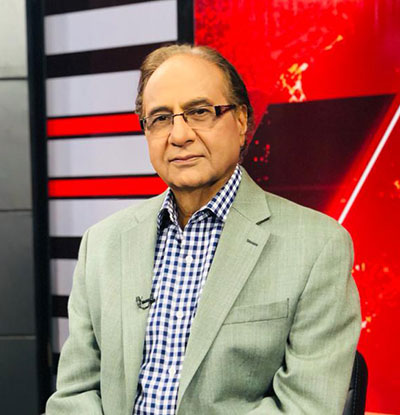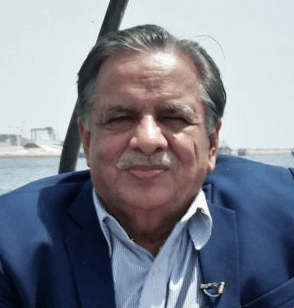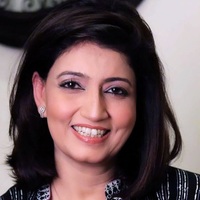A perception has been created by some interest groups that media is under siege in Pakistan and dissenting voices are being silenced. But then there are those experts and commentators who say that Pakistan’s vibrant and candid media tells an altogether different story. Does the situation on the ground lie between these two extreme views?
Narratives asked veteran journalists Ihtasham Ul Haq and Mujahid Barelvi along with prominent political commentator and educationist Huma Baqai to give their views on this month’s ‘Big Question.’
Propaganda & Prejudice

Veteran journalist and leading political analyst and commentator. He is a recipient of four APNS (All Pakistan Newspaper Society) and four international journalistic awards.
Over the years, we Pakistanis have developed the habit of taking an extreme position, rightly or wrongly, on major internal and external issues. This is perhaps the reason that we do not look beyond certain self-created notions and take a partisan rather than a holistic view of the situation. It is in this background that we have borrowed the terminology of “press under siege,” meaning that we do not have freedom of the press and that the government and the state are bent upon curbing this freedom. In reality, some individuals and media houses paint a bleak picture about the freedom of the press create an illusion.
In Pakistan, unabashed vilification of sensitive state institutions has become the norm. Media houses across Pakistan are responsible for such brazen acts and tend to justify it in the name of freedom of speech.
The concept of absolute free speech is intrinsically defective in theory. In practice, it is even more blemished and highly politicised. Pakistan is the perfect case study. Anyone can say just about anything about state institutions and get away with it on the pretext of freedom of speech. Whether it be civil society, the so-called liberal brigade, or the political parties, nowhere in the world is the concept practiced in such an unbridled manner. Across the entire West and even in the most liberal of societies, there are constitutional provisions to protect the sanctity of cardinal state institutions which invariably include armed forces and the judiciary. Throughout the liberal world, there are libel laws, laws of defamation and sedition, journalistic standards, and rules that govern the media and social media.
Unfortunately, in Pakistan, chiding these state organs is thought of as synonymous with freedom. In the days of world wars, groups that would indulge in spreading misinformation and acting on the enemy’s agenda were labelled ‘fifth columnists.’ In our country, they refer to themselves as ‘intellectuals’ and call concocted stories ‘dissent.’ Is this not how hostile intelligence operates, weakening defence lines by spreading disinformation and clandestinely sympathising with the enemy? Is this not treason? Is this not war against the state? How long do they believe the common man would not take notice? Not long surely, as many journalists and so-called analysts are now openly being called out by the public on social media, pointing out their hypocrisy and posting logical rejoinders to question their credibility. A few journalists have also recently been exposed as having links with hostile countries and their accounts have been traced as operating from inimical territory. No self-respecting state would allow such unethical and treacherous behaviour, even though the state of Pakistan is probably under western pressure over so-called human rights and free speech levers to condone such conduct.
Media houses, journalists, rented bloggers, or a normal Pakistani for that matter, must refrain from this prejudice towards state institutions in the name of freedom of speech. While the public is increasingly aware now and is confronting an unjustified onslaught against institutions, the state needs legislation to rein in such sections of the society. The case here goes beyond the defence of state institutions. Unrestrained speech can generate great social upheaval, stoke sectarian hatred, and promote religious intolerance. It is without a doubt, the biggest existential threat to the state. Peace and order are not self-enforcing. They must be organised and guarded with fervour. Our media is among the most unrestrained in the world; and if anything, we need more limits, more ethical compliance, and most of all a degree of patriotism and common sense.
Fact & Fiction

Senior journalist, author & prominent anchorperson
I started my journalistic career during the final years of Zulfikar Ali Bhutto and also faced the dictatorial years of Gen. Muhammed Zia ul Haq, which was the worst period in the political history of Pakistan, particularly for the print media.
For full one decade, the media remained under siege and journalists, including myself, faced hardships and even sentenced to rigorous imprisonment. Four journalists were subject to the barbaric punishment of lashes. Today, the media group which claims to be the torchbearer for the independence of media and journalists who work for this particular media group, forget that not even a four-line news item was published in their daily newspaper about those journalists receiving lashes. Yes, I admit that at that time, Dawn was the only newspaper brave enough to publish it. After the dark era of Gen. Zia, the Benazir Bhutto and Mian Nawaz Sharif periods were not ideal either. And yes, all the credit goes to General Pervez Musharraf who not only empowered the media but for the first time in the history of Pakistan, allowed the electronic media to thrive, which paved the way for a new era of journalism. The credit of freedom enjoyed by print and electronic media in Pakistan duly goes to military ruler General Pervez Musharraf who ironically fell victim to the same free media.
One of the most significant developments in media is the status of four media groups, which now monopolise the electronic media and have transformed their media houses into empires. During this time a new phenomenon surfaced — television anchor persons. Their salaries ran into millions. It was actually these anchor persons, who became the tool of these media empires. Now they want to dictate to civilian and military governments.
Yes, they were highly successful, acquired wealth and the two main political parties also came under their pressure. The governments that came into power in 2008 and 2013, the PPP and the PML-N respectively, both tried to win support of these media empires and either showered them with favours or in some cases resorted to arm twisting to bring this or that group in line. The real conflict began when the third option, in the form of PTI came into power in 2018, and refused to take dictation from these empires.
I, as a witness of the past four decades of journalism in Pakistan, believe that there has never been an ideal situation for media in Pakistan. In the past three years, some individuals with power and resources, and a couple of media groups, did suffer some setbacks but it would be untrue that the entire print and electronic media has remained under siege. The overwhelming trend remains positive for the media.
Today, the Pakistani media is free to call their elected Prime Minister “selected,” “corrupt” or “thief.” And which country allows its journalists to directly name and blame their army officials and prime agencies? All this hue and cry does not reflect the voice of the majority of the people and even the mainstream political parties do not take such a stand.
And those few, who were at the receiving end, suffered because of their own unprofessionalism, political activism and propagandist approach in journalism. They acted as mouthpieces of this or that political party. Some of them crossed all limits and tried to taint the image of the armed forces and its top officials by false allegations and repeating the propaganda of the foreign powers. Even then, Pakistani state and the government have showed restrained.
Only one senior anchor was removed from his primetime TV show, but his media group did not disclose the reason why did it take this step. So, if they have the courage of our media old guards like Minhaj Barna, Nisar Usmani and Abdul Hameed Chhapra, let them bravely name names. Let me assure them that they would not be hanged or lashed as a consequence.
Let’s speak the truth. Today, it is not the press freedom, which is under threat, but the vested interests of individuals and big media groups that remain threatened.
Craving for Alternate Views

Chairperson & Associate Professor at IBA, leading commentator on political and foreign affairs
The basic premise of libertarian media function theory is under threat in the post-truth era. The function of the media as the fourth pillar of the state that informs to protect is under severe stress. Excessive commercialisation of the media, the subsequent elite capture and the commodification of news has transformed journalism globally. It is not people-centric anymore. However, at the same time, the media has increasingly started playing a pivotal role in modern day politics. For instance, its capacity to speedily move information from the top of the decision-making pyramid to the bottom. In fact, with the emergence of internet technologies and the recent introduction of social media, the relevance of media institutions and their capacity to influence public debate and set agendas has increased. They have to an extent, even shaped perceptions and political preferences.
The space for concerned citizens and critical thinkers is drastically shrinking; calling a spade a spade is seen as anti-societal, anti-national and anti-peace. The ability of democratic governments to deal with dissent has dwindled tremendously. Political parties dish out positions based on the loyalty factor and therefore dissent, or an alternative view is not an option. There is usually no dissent or discussion in the mainstream political parties. They are plagued by personality cults and the voice of the supreme leader is projected as a consensus view. The primary vehicle of dissent, media and academia, are also systematically silenced. This is a global phenomenon; however, the proliferation of media and the emergence of alternative venues allows dissent to surface, even when brutally silenced through various strategies. The recent triumph of personality cult leadership in South Asia both partnered and resulted in coercion of media. This worked to a point but backfired; social media, citizen journalism and access to alternative sources ended up putting the oppressor on the back foot. The exposure happens sooner than later, and the subsequent damage control is both embarrassing and humiliating. Pointed questions are asked and those in corridors of power are compelled to respond.
Pakistan continues to remain the most dangerous country in the world for journalists and more and more people critical of the establishment’s view are being threatened and marginalised. Serious reservations exist in thinking circles about the Pakistan Electronic Crimes Act 2016. New sections are added to it to make it more encompassing. I find this a self-defeating exercise; we live in an era of information overload, global searchlights and false narratives. No amount of preventive and oppressive legislation will suppress the alternative view. The Pakistan media development authority seems to want to further expand censorship powers over social media — a proposal which is neither permissible under the constitution nor practically possible. The tendency to do this is on the rise even in liberal and not so liberal democracies. The temptation to do this may be high, but it is highly counter-productive.
Control and coercion are outdated methodologies. Even very lucrative capture of the media, despite all its dividends is losing its lustre — people crave alternative views. The creation of innovative strategic narratives is at the core of modern strategic communication; be it business, politics or even warfare. It is a battle of narratives; stifling dissent is not an option in today’s post-truth era neither are political lies, exaggeration and spin. The narrative must be built around feelings and not necessarily facts. The Brexit vote, Donald Trump’s victory, the rejection of climate change science and the vilification of immigrants have all been based on the power to evoke feelings and not facts. The term post-truth made it to the Oxford dictionary in the year 2016 but before that it had already became a cliché. The concern is that beyond being the word of the year 2016 and the political buzz word of the moment; ‘post-truth’ could be the spirit of the coming decade, says Matthew D’ancona in his book Post Truth. Media is becoming a whole new ball game; let’s learn the game before we make the rules or even start to cheat for that matter.



